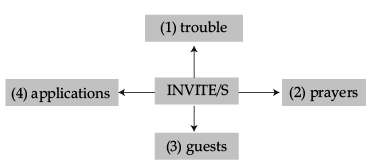Extract Based Questions Test: Glimpses of India - 1 - Class 10 MCQ
10 Questions MCQ Test - Extract Based Questions Test: Glimpses of India - 1
Direction: "Our elders are often heard reminiscing nostalgically about those good old Portuguese days, the Portuguese and their famous loaves of bread. Those eaters might have vanished but the makers are still there. We still have amongst us the mixers, the moulders and those who bake the loaves. Those age-old, time-tested furnaces still exist. The fire in these furnaces has not yet been extinguished. The thud and jingle of traditional baker's bamboo, heralding his arrival in the morning, can still be heard in some places. "
Q. The narrator says that the furnaces were 'time-tested' because :
Direction: "Our elders are often heard reminiscing nostalgically about those good old Portuguese days, the Portuguese and their famous loaves of bread. Those eaters might have vanished but the makers are still there. We still have amongst us the mixers, the moulders and those who bake the loaves. Those age-old, time-tested furnaces still exist. The fire in these furnaces has not yet been extinguished. The thud and jingle of traditional baker's bamboo, heralding his arrival in the morning, can still be heard in some places. "
Q. Pick the idiom that brings out the same meaning of 'reminiscing' as used in the passage.
Direction: "Our elders are often heard reminiscing nostalgically about those good old Portuguese days, the Portuguese and their famous loaves of bread. Those eaters might have vanished but the makers are still there. We still have amongst us the mixers, the moulders and those who bake the loaves. Those age-old, time-tested furnaces still exist. The fire in these furnaces has not yet been extinguished. The thud and jingle of traditional baker's bamboo, heralding his arrival in the morning, can still be heard in some places. "
Q. 'Those eaters might have vanished but the makers are still there'. Pick the option that expresses the tone of the narrator.
(1) Elated
(2) Morose
(3) Nostalgic
(4) Hopeful
(5) Sarcastic
(6) Critical
(7) Celebratory
Direction: "Our elders are often heard reminiscing nostalgically about those good old Portuguese days, the Portuguese and their famous loaves of bread. Those eaters might have vanished but the makers are still there. We still have amongst us the mixers, the moulders and those who bake the loaves. Those age-old, time-tested furnaces still exist. The fire in these furnaces has not yet been extinguished. The thud and jingle of traditional baker's bamboo, heralding his arrival in the morning, can still be heard in some places. "
Q. The 'fire in the furnaces has not yet been extinguished' implies that :
Direction: "Our elders are often heard reminiscing nostalgically about those good old Portuguese days, the Portuguese and their famous loaves of bread. Those eaters might have vanished but the makers are still there. We still have amongst us the mixers, the moulders and those who bake the loaves. Those age-old, time-tested furnaces still exist. The fire in these furnaces has not yet been extinguished. The thud and jingle of traditional baker's bamboo, heralding his arrival in the morning, can still be heard in some places. "
Q. Why do you think the baker came in with 'a thud and a jingle'?
Direction: The baker or bread-seller of those days had a peculiar dress known as the kabai. It was a single piece long frock reaching down to the knees. In our childhood, we saw bakers wearing shirt and trousers which were shorter than full-length ones and longer than half pants. Even today, anyone who wears a half pant which reaches just below the knees invites the comment that he is dressed like a pader!
Q. Choose the answer that lists the correct option about the recording of the baker’s monthly accounts.

Direction: The baker or bread-seller of those days had a peculiar dress known as the kabai. It was a single piece long frock reaching down to the knees. In our childhood, we saw bakers wearing shirt and trousers which were shorter than full-length ones and longer than half pants. Even today, anyone who wears a half pant which reaches just below the knees invites the comment that he is dressed like a pader!
Q. The statement that is TRUE about payment collection, according to the passage is:
Direction: The baker or bread-seller of those days had a peculiar dress known as the kabai. It was a single piece long frock reaching down to the knees. In our childhood, we saw bakers wearing shirt and trousers which were shorter than full-length ones and longer than half pants. Even today, anyone who wears a half pant which reaches just below the knees invites the comment that he is dressed like a pader!
Q. When the writer says, ‘Baking was indeed a profitable profession in the old days’, he means that:
Direction: The baker or bread-seller of those days had a peculiar dress known as the kabai. It was a single piece long frock reaching down to the knees. In our childhood, we saw bakers wearing shirt and trousers which were shorter than full-length ones and longer than half pants. Even today, anyone who wears a half pant which reaches just below the knees invites the comment that he is dressed like a pader!
Q. The extract uses the phrase, ‘invites (the) comments’. Which of the following expressions is INCORRECT with respect to the word ‘invites’?
Direction: The baker or bread-seller of those days had a peculiar dress known as the kabai. It was a single piece long frock reaching down to the knees. In our childhood, we saw bakers wearing shirt and trousers which were shorter than full-length ones and longer than half pants. Even today, anyone who wears a half pant which reaches just below the knees invites the comment that he is dressed like a pader!
Q. The kabai was a ‘peculiar’ outfit as it was:


















